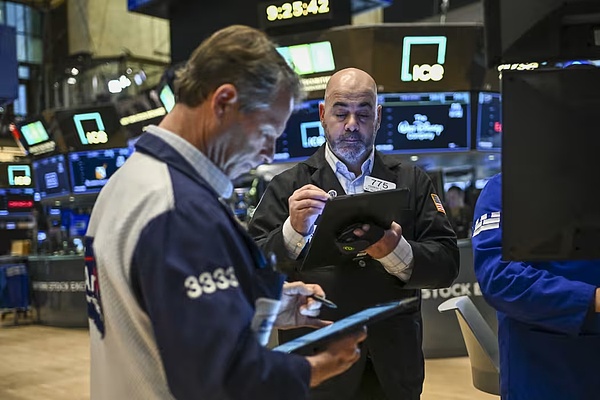
Source: Barron Chinese
Nine out of 10 respondents believe that U.S. stocks are overvalued, the highest in more than 20 years. Trade and others Major changes in a very short period of time have increased uncertainty about the U.S. outlook.
Some people may think that the United States is the best investment destination. The United States has the largest and most innovative technology company. The dominance of the US dollar is unmatched. US Treasury bonds are the safest asset in the world. . However, Wall Street fund managers seem reluctant to make a promise for the United States this year.
Bank of America (BofA) concluded based on a recent study that investors' confidence in the American exceptionalism is waning. Bank of America's latest fund manager survey shows that investors' confidence in investing in the United States has declined, a sign that investors are increasingly considering recent geopolitical turmoil and uncertainty.
Bank’s February FX and Rates Sentiment Survey shows that more than one-third of fund managers believe that the “American Exceptionism” narrative is losing Momentum, 36% of respondents expect that both the U.S. stock market and the U.S. dollar will decline by the end of this year.
Bank U.S. foreign exchange strategist Alex Cohen wrote in a research report earlier in February that "'American Exception' is not dead, but warning signals are increasing." .”
The Global Fund Manager Survey in February reflected similar topics. The survey has a larger sample size, with nearly 200 fund managers managing assets of more than $400 billion. The current asset allocation decisions of fund managers can be learned from the survey results released on February 18.
Fund managers are no longer so keen on the "Big Seven" of US stock technology or the US dollar (Bank of America believes that both of these benefit from the "American exceptionalism"). A February survey showed that 73% of fund managers were most keen on buying these two types of assets. The Bank of America wrote in its survey that the percentage looks high, but is down from the three-year high of 80% in January.
Fund managers' preference for U.S. stocks has also declined: Among all asset classes, fund managers expect international stocks to be the best performing assets in 2025, with 34% of respondents holding this view, only 18% of respondents believe that the U.S. stock market has the highest returns this year, followed by gold. In a survey in January, the proportion of respondents who believed that U.S. stocks performed the best this year were the highest.
BankAmerican strategist Michael Hartnett wrote that this “shows investors’ belief in ‘American exceptionalism’ has reached its peak.”
The survey also showed that the proportion of respondents who believe that the European Stock Index will record the biggest increase this year, which is the same as JanuaryThe survey results were contrary, when the highest proportion of respondents believed that the Nasdaq Composite Index would hit the biggest gain this year. Nine out of 10 respondents believe that U.S. stocks are overvalued, the highest in more than two decades.
In summary, the survey more comprehensively reflects investors' perceptions of the United States are changing against the backdrop of Trump's return to the White House and the escalating geo-tension, with trade and others in a very short time Major changes in the United States have increased uncertainty about the prospects.
Cohen mentioned in his list of risk factors, he mentioned the impact of uncertainty brought about by the escalating trade war on the narrative of “American Exceptionism”.
The above two February investigations were conducted after Trump took office, and the January investigation was before the president's inauguration day.
Tariffs can indeed reduce the total U.S. imports, but it is not clear to what extent tariffs can reduce U.S. deficits. In fiscal year 2024 ended September last year, the U.S. deficit rose to $1.83 trillion. Deficits are a major pain point for investors.
The Congressional Budget Office estimates that the deficit in fiscal 2025 will remain near the $1.9 trillion level.
Senior marketer David Rosenberg wrote an article last Friday (February 14), "When you hear the 'American Exceptionism', and the US economy and the rest of the world When it comes to how great it is, let's just say it's a macroeconomic background created by Uncle Sam's long arms and deep pockets. "
At the same time, it's made up of 600 European stocks The European Stoke 600 index and the German DAX index, which consists of 40 major blue chip companies in Germany, hit record highs on Tuesday. The European Stoke 50 index rose 13% this year, compared with the 3.8% increase in the technology-based Nasdaq Composite Index.
European stocks are receiving a boost from a number of factors. Trump demands Europe The rise in defense stocks caused by increased military spending is one factor, and another is that investor confidence in the United States appears to be declining. Earlier this year, Deutsche Bank strategists proposed to increase their holdings of European stocks instead of U.S. stocks, noting that the market has become accustomed to strong U.S. economic growth and neglected improvements in Europe.
Wall Street is expressing the challenged view that “American exceptionalism” is more loudly. Morgan Stanley said last week that he was pessimistic about the dollar, and the agency's strategist said: "We believe the U.S. fiscal deficit will continue to expand, and the 'U.S.'s exceptionalism' has been largely digested." Silver strategists pointed out at the end of January that the "American Exceptionism" narrative has become very expensive and has been fully digested.











